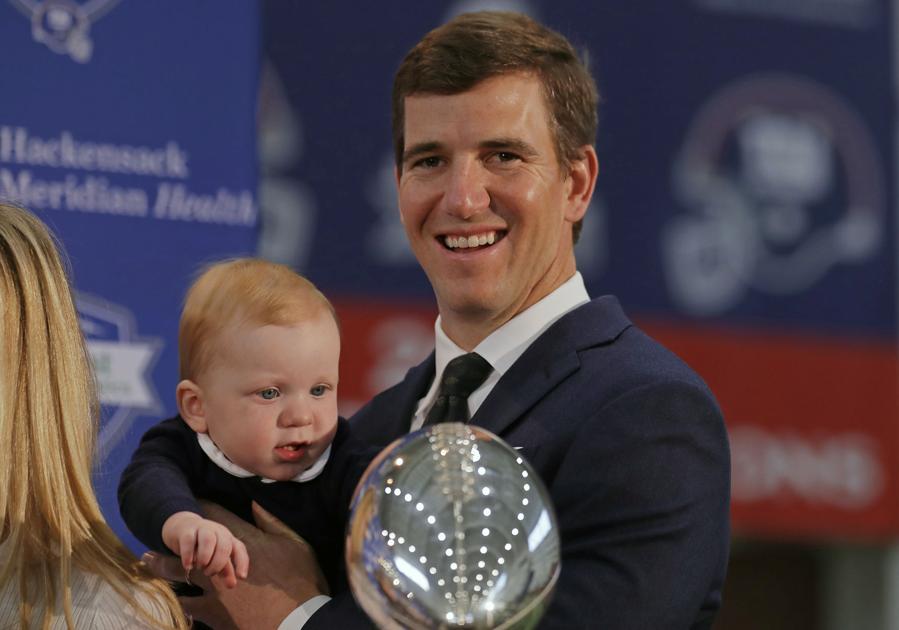The elephant in the room isn’t causing much of a ruckus … yet.
It’s sitting there, patiently, waiting for the lead-up to the vote for the 2025 Pro Football Hall of Fame.
With Peyton Manning set to be enshrined in the Pro Football Hall of Fame this weekend, it begs the question: is his brother Eli Manning next?
Eli casually dismissed the notion earlier this summer at the Manning Passing Academy in Thibodaux, shifting focus to Peyton’s upcoming moment.
At any rate, Eli has plenty of time to think about it, considering he’ll first be eligible for the Hall of Fame in four years.
Manning’s resume is divisive for Hall of Fame selectors and sports fans alike. He’s an enigma. The man is responsible for two of the biggest David-topples-Goliath moments of the past 15 years — but the overall picture, and his regular-season stat line, paint a muddier picture.
The Case For Eli
The New Orleans native was named Super Bowl MVP twice in XLII and XLVI for the New York Giants, both times holding the Pete Rozelle Trophy after thwarting the machine that was the New England Patriots — which in itself says something. There’s no statistical measurement that can truly quantify the magical. But we can come close.
The perfect 17-0 Patriots were 14-point favorites ahead of Super Bowl XLII. The notion of the Giants, a team that carried a 10-6 record after the regular season, winning that game? It seemed preposterous, even if the Giants had beaten the Buccaneers, the 13-3 Cowboys and the 13-3 Packers in overtime to make their way to the pinnacle game.
But it happened. Sure, Manning doesn’t deserve the all the credit for the win (the Giants’ defensive line played a large part, too), but his clutch fourth quarter, with a touchdown pass to David Tyree, that memorable Houdini-like long throw, also to Tyree, and a last-minute touchdown pass to Plaxico Burress helped clinch New York’s fate as victorious underdogs.
Manning’s Giants weren’t favored in 2011 against the Brady and Co., either. They lucked into an overtime win against the 49ers in the NFC Championship Game after beating the near-perfect Packers the weekend before.
Coming into that postseason, the Giants won the NFC East with a 9-7 record, one of those regular-season wins having come in November against the Patriots. That loss for New England was the third and final loss the Patriots had in that regular season. After that, they won 10 straight en route to yet another Super Bowl berth, where Manning’s heroics sniped their chances at a ring.
Not every Super Bowl MVP has been selected to the Pro Football Hall of Fame, but the majority of those eligible have been. There are 37 former Super Bowl MVPs that are eligible for the Pro Football Hall of Fame — and of them, 23 have been inducted into the Hall. That’s 62%.
But Manning isn’t just a Super Bowl MVP. He’s a two-time Super Bowl MVP.
Only five men have multiple Pete Rozelle Trophies: Bart Starr, Terry Bradshaw, Joe Montana, Tom Brady and Manning. Starr, Bradshaw and Montana were all first-ballot Hall of Famers, and Brady will be, too, whenever his career actually comes to a close.
The most recent five quarterbacks inducted into the Pro Football Hall of Fame are Peyton Manning (Class of 2021), Kurt Warner (Class of 2017), Brett Favre (Class of 2016), Ken Stabler (Class of 2016) and Warren Moon (Class of 2006).
Eli’s general stats are in the mix with those players.
Eli completed 60.3% of his passes for 57,023 yards with 366 touchdowns, for a touchdown rate of 4.5%. He had 244 interceptions for an interception rate of 3.0%.
In terms of completion percentage, Eli’s numbers are the third-worst among them. Moon completed 58.4% of his passes and Stabler was at 58.9%. Favre was a smidgen above Eli at 62.0%, while Peyton and Warner were at 65.3% and 65.5%, respectively.
For percentage of passes as interceptions, Eli has the second-best rate. Only 2.7% of Peyton’s passes turned out to be interceptions, while 3% of Eli’s were. Warner (3.1), Favre (3.3) and Moon (3.4) all were higher, and Stabler was at 5.9%.
Outside of his Super Bowl MVPs, Eli has similar trophy cases to a couple of them. Eli was named to four Pro Bowls (2008, 2011, 2012, 2015), the same amount that both Warner and Stabler have.
The Case Against Eli
Comparing the quarterbacks of older eras to current quarterbacks is futile. It’s all football, of course, but the game Eli played is very different than the game played by Stabler, Moon and the men who preceded them.
So while their statistics may be comparable with Eli’s, quarterbacks of his era were putting up comparable numbers, if not better.
Eli was never once named to an All-Pro team. He has four Pro Bowls to his name, but those are the only large on-field accolades Eli has won as a pro, outside of Super Bowl MVP.
He rarely won even weekly accolades. In 236 games, Manning earned just four NFC offensive player of the week nods. (In 2013 alone, his brother won three AFC weekly accolades.)
The only NFL season-best record Eli obtained was most interceptions (2007, 2010, 2013).
Eli had a career-best 4,933 yards passing in 2011, and his efforts ranked fourth league-wide, sitting behind Drew Brees, Tom Brady and Matthew Stafford. When he threw for 35 touchdowns in 2015, he was tied for second with three other players. Brady led the league that year with 36, but Blake Bortles, Cam Newton and Carson Palmer also tossed 35 touchdowns that year.
In 2018, Eli had his best season in terms of completion percentage at 66%. That didn’t even make the top 15 for the year. It tied for 16th.
Other factors at play
Even though players are judged based off of their resumes, their resumes have to stack up against other players eligible in a given year.
Sometimes players who deserve to get in the Hall of Fame end up waiting, because there are others whom the voters deem more deserving in a given year.
It’s a tough group to crack. Only five former players make the final cut every year — a far cry from the pool of more than 100 nominees each fall.
Manning is one of several big names who will be first-year eligible for the Hall in 2025. There’s kicker Adam Vinatieri, running back Marshawn Lynch, safety Eric Weddle, running back/return specialist Darren Sproles and linebacker Luke Kuechly, to name a few.
Some other first-year players eligible in 2025: tight end Vernon Davis, center Travis Frederick, center Ryan Kalil, linebacker Clay Matthews, tackle Joe Staley, linebacker Terrell Suggs, receiver Demaryius Thomas, defensive end Cameron Wake and guard Marshal Yanda.
That list goes without mentioning some of the talent eligible in preceding years who ultimately won’t make the cut for their first go-round.
And then there’s the fact that both Drew Brees and Philip Rivers will be eligible for the Hall of Fame in 2026. Tom Brady and Ben Roethlisberger won’t be too far behind, either, as their careers will end sooner rather than later. There’s Aaron Rodgers down the line, too.
Just looking at the next few years, there could be a quarterback bottleneck in the Hall of Fame. Does Manning get in early on in the run of quarterbacks? Or does he get left behind?
Time will tell. And as 2025 approaches, the case for Eli Manning, and against him, will continue to gain steam.
Originally found on Read More


![[VIDEO] Meghan McCain Just Can’t Stop Blasting Biden Lately…](https://manateeherald.com/wp-content/uploads/2021/06/300-4IokkF.jpeg)




